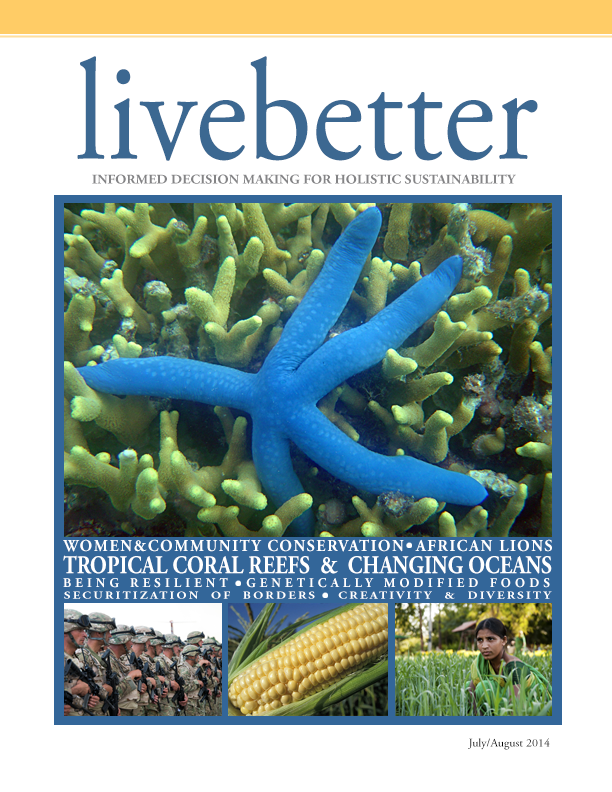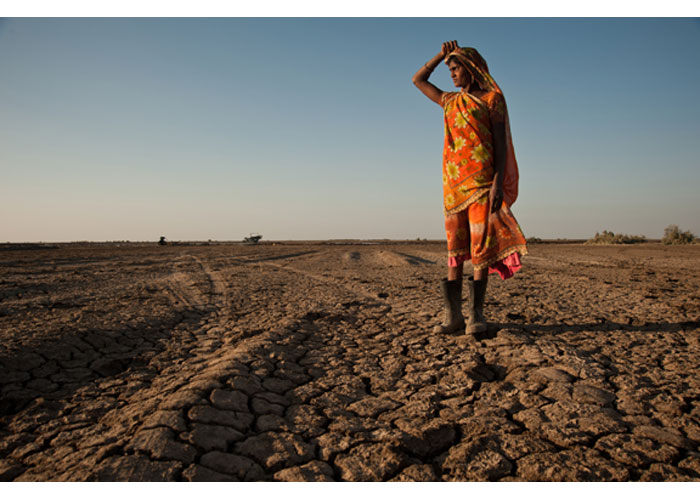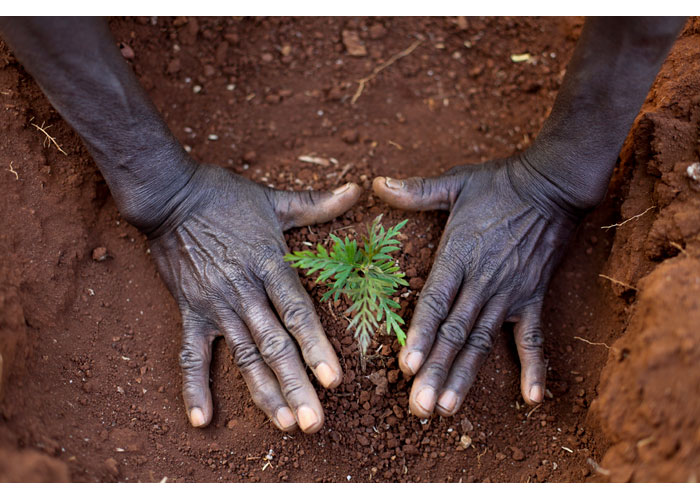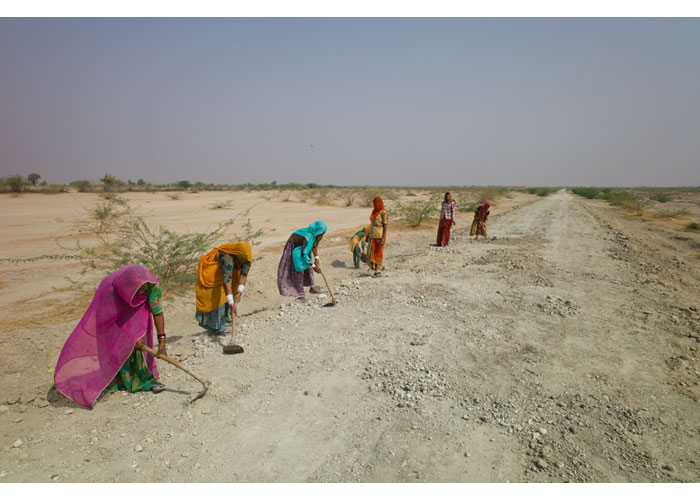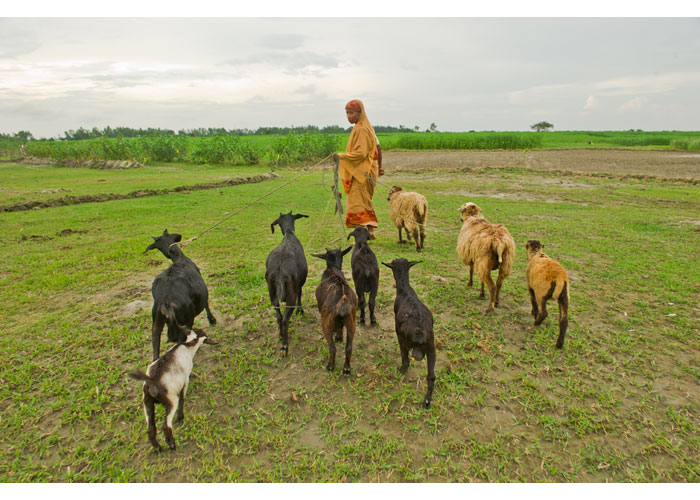Colonel (Ret.) Mark Mykleby on 21st Century Security
It’s common knowledge the Department of Defense (DoD) has considered the science of climate change, and it has accepted the conclusion that it’s real (reference the 2010 Quadrennial Defense Reviewi). Climate change and energy efficiency are now standing military planning considerations as both will impact the 21st Century strategic landscape and operational environment to such a degree that to not address them would be a gross dereliction of duty and an abrogation of responsibilityii.
As such, plans are being developed and executed to address the risks of climate change to military installations and global military operations. In addition, all Services within DoD have acknowledged and are addressing the operational and tactical necessity of developing deployable renewable energy technologies to achieve energy autonomy in the field as a means of reducing logistical vulnerabilitiesiii. Simply put, within the U.S. military, there is no debate about the risks, threats and challenges of climate change and energy dependency as they relate to our national security. Accordingly, the U.S. military is taking prudent action both at home and abroad to address these issues.
I hope highlighting the fact that the military takes climate change seriously helps with the national discourse amidst a great deal of craziness on the subject. But, there is a more important issue underlying our national anxieties and fears. We’ve become too ready to cast off our responsibilities as citizens by outsourcing them to other segments or institutions of society. Nowhere is this more prevalent than when it comes to “national security.” Whether it’s the rise of China, Iranian saber rattling, global terrorism, the war on drugs, illegal immigration, hurricanes, earthquakes, nation building or, now, climate change and renewable energy, our country has become too comfortable looking to the military in particular to address every vexing issue that emerges in our lives.
That’s why I want to talk about national security and the responsibility that comes with citizenship. Specifically, I want to challenge my fellow citizens to take their security into their own very capable hands and, in the process, to shape the course and destiny of our nation. The fact of the matter is that security in the 21st Century has little to do with what security was all about in the 20th Century. National security, as defined in the 21st Century, can no longer be considered just a military issue that begins at our shores and extends outward. Twenty-first Century security is more about the vibrancy and resilience of essential systems operating within our borders and so intimately intertwined with the larger “global system” that constitutes human civilization as we understand it – food, water, energy, education, industry, mobility, information, the built environment, public health and the global ecology.
Yet, for some reason, we can’t bring ourselves to have an adult conversation about what constitutes national security today and the direction we’re heading as a nation. Take climate change as a “small” example. A recent Yale/George Mason University poll found that only 46 percent of the 64 percent of Americans who believe in climate change actually think climate change is the result of human activity (the 64 percent number is scary enough).iv As a result, there is no real public discourse, let alone action, to address a problem most scientists accept as factually grounded and a simple look out the window readily confirms. If the philosopher and mathematician Blaise Pascal were alive and well today, he would find our wholesale vacillation fascinating. He would also think we were nuts. Climate change, after all, is our modern day version of Pascal’s Wager and we’re not taking the smarter bet.
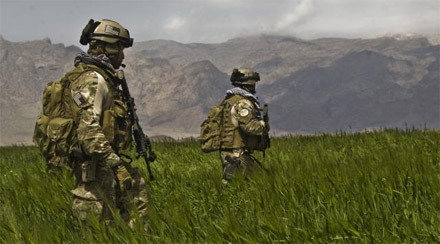
Photo Credit: Spc. Joseph A. Wilson|Special Forces Soldiers patrol a field in the Gulistan district of Farah, Afghanistan, with Afghan National Army commandos on April 12, 2011.
Still, the words “national security” get plenty of attention, particularly in the political season currently (or, more accurately, constantly) upon us. As voters we collectively demand politicians stand tough on national security. The problem is we limit our definition of security to only those things we can find, track, fix and finish (a little military jargon that means we only focus on bad guys). Accordingly, our political discourse is predisposed to invoke specters of our worst fears, anxieties and angst . . . Al Qaeda, China, Iran . . . all threats we need to defend against. As a product of the Cold War, we have blurred the distinction between defense and national security – so much so that we tend to use the terms interchangeably.
The end result is we’re effectively undermining our national security in the name of defense by ignoring the unsustainable nature of our entire national system. Simply stated, we’re depleting our national resources and bleeding our national strength by seeking to preserve a perceived status quo with an almost obsessive focus on risks and threats. This isn’t to say we don’t need a strong military. There are bad people in the world who are doing and will continue to do bad things, and they need to be dealt with. But, we must strike the proper balance between defense and the full spectrum of what constitutes national security in the 21st Century.
In 1961 President Eisenhower presciently implored our nation to consider this balance in his farewell address to the nation.v In his address, he shared his concerns about the “military industrial complex” and its inherent threat to our nation’s fiscal solvency. Today, we’re seeing Eisenhower’s warning come to fruition. We continue to expend enormous amounts of national resources on mechanisms and institutions whose original purpose, national defense, has been eclipsed by the need for the machine to feed itself even at the expense of the security of our nation. We continue to pour more and more resources into calcified organizations, inflexible institutions, irrelevant processes and paradigmatic weapon systems in a vain attempt to control the uncontrollable without ever challenging the logic or efficacy of our actions.
All the while, we marginally address things we can control and that are the central root causes of the most problematic, complex and very real challenges to national security: an exorbitant national debt and real possibility of fiscal insolvency; waning global influence and credibility as a result of our perceived national hubris; suburban sprawl incoherently designed to accommodate cars rather than people; a gluttonous national lifestyle that creates systemic, preventable health problems costing our nation billions of dollars each yearvi; a food production and distribution system dependent on subsidies, petroleum and farming techniques that degrade soil and damage national health; unsustainable energy policies and infrastructures that disregard the limits of earth’s energy resources; a general disregard for the environment and overt rejection of responsibility to bequeath to our children a world worth living in and a lackluster educational system, which has resulted in a general decline in national capacity to innovate and compete on a global scale.
These are but a few of the products of an outdated model for civil society wholly dependent on a never-ending petroleum supply and the hope that we can control global dynamics to such an extent that the status quo will continue ad infinitum. Unfortunately, neither oil norcontrol will make this model work, for it fails to accept the realities of our world: interconnectedness, interdependencies, emerging (perhaps unseen) challenges and, most importantly, opportunities that the time we have affords us to act deliberately and purposefully to prepare for global changes set in motion. The national security implications of these phenomena are as severe, if not more severe, than any external threat we can imagine lurking in the dark.
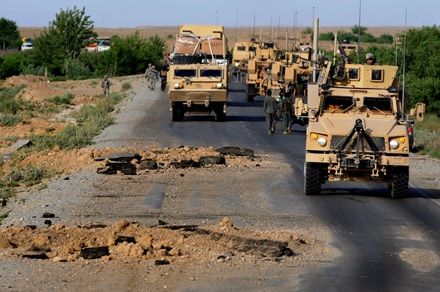
U.S. Air Force photo by Senior Airman Kenny Holston|U.S. Army members go around Improvised Explosive Device blast holes created a few hours prior to their convoy passing through Southern Afghanistan on April 30, 2010.
If we are to be truly “secure” in the future, we must recognize that today’s complex, interdependent and resource-constrained world demands we move beyond a system of defense that leverages force and power as means to control perceived risks and threats. We have to face the reality that the manner in which we, as citizens, act and live right here at home has more to do with our national security than our military’s ability to conduct large-scale combat operations abroad. Most importantly, although we have the finest, most professional, most capable military the world has ever known (and I can’t express just how proud I am to have been part of it), the enduring security of our Nation, 21st Century style, is in the hands of our citizenry, not just in the hands of our military.
This is the conclusion that Captain Wayne Porter, United States Navy, and I came to while serving as special strategic assistants for Admiral Mike Mullen, former Chairman of the Joint Chiefs of Staff. This is why we wrote our independent (and unsanctioned) paper, “A National Strategic Narrative” (published in 2011 by the Woodrow Wilson Center) We wanted to express a new way forward for our nation – one that doesn’t shy away from the enormous challenges we face going into the 21st Century, but yet is still wedded to a more positive, opportunities-based view toward the future and not to some masochistically nostalgic, risk-averse view toward our past. We wanted to declare that we don’t have to shed our well-earned moniker of “The Land of Opportunity” and acquiesce to a default label of “The Land of Threat and Risk” just because the world has changed and no longer subscribes to the rule sets we’ve grown comfortable with. We wanted to tell a story about what America is for and not what it’s against.
As such, the National Strategic Narrative isn’t a strategy. It never was intended to be. There are too many strategies in Washington, D.C., anyway. In fact, we have so many strategies that we don’t have a strategy. We have a National Security Strategy, National Defense Strategy, National Military Strategy, National Health Security Strategy, National Strategy for Trusted Identities in Cyberspace, National Strategy for Information Sharing. We even have a collection of National Strategies for Advancing Bicycle Safety. This is but a small sampling of the litany of documents continuing to emerge from every corner of every governmental bureaucracy, which share no sense of common purpose or direction.
And the most frustrating thing about these strategies is most of them aren’t even strategies at all. They end up being watered down wish lists promising all things to all people, making no hard prioritization decisions and, in the end, requiring an infinite application of resources for an infinite amount of time. These aren’t strategies. They are clear demonstrations of our ignorance of the very real issues and challenges facing us as a nation, not to mention our unwillingness to take a fresh look at our current and future condition.
What the National Strategic Narrative was intended to be is a story to which the American people – as well as people around the world – can look to explain the direction our nation will take into the 21st Century. Americans are searching for a consistent, enduring path that not only addresses their interests of prosperity and security but also preserves and propagates our values and national purpose as delineated in the Preamble of our Constitution. We felt that our nation needs a clear, coherent and compelling way forward to carry us through the complexities we face today and lead us toward a national design that promises a better world for tomorrow. Our intention was to articulate a philosophy for such a national design and, in so doing, catalyze a new conversation across our nation that would eventually lead to a 21st Century American grand strategy.
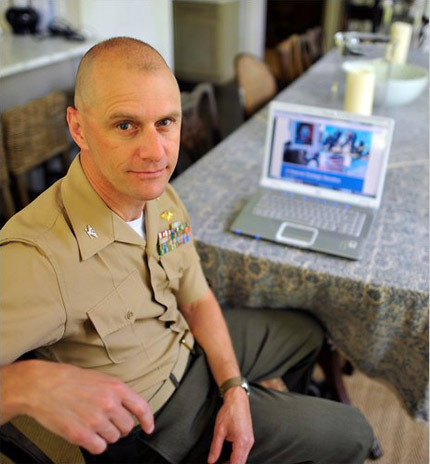
© http://blogs.jccc.edu/|Mark Mykleby, Colonel, USMC (Retired)
Substantively, the National Strategic Narrative argues for a grand strategy (and eventually a new National Prosperity and Security Act to replace the outdated National Security Act of 1947) that focuses foreign and domestic policies toward the common goal of building our national strength and credible influence so we can shape and prepare for our future over the long term – a strategy that creates a national system allowing us to adapt, compete, grow and evolve in a manner commensurate with our values as a people and which is sustainable over time. Specifically, the National Strategic Narrative offers the concept of sustainability as our national strategic imperative for the 21st Century.
Why should sustainability, essentially an ecological concept, serve as the centerpiece of a 21st Century American grand strategy? The reason lays simply in its definition. In ecology, sustainability describes how biological systems “remain diverse and productive over time.”vii In this definition, “diversity” relates to “resilience” and “productive” relates to “growth” – resilience and growth being critical aspects of our two primary enduring national interests of security and prosperity.viii Just as importantly, this definition includes the words “over time.”
Sustainability is not an end-state in and of itself. It’s a strategic mindset and philosophy that can carry us forward in time just as Kennan’s concept of “containment” carried our nation through the Cold War years. In this sense, sustainability, as a central, coalescing grand strategic concept, would serve to pragmatically inform our national policy decisions regarding investments, security, economic development, energy, environment and engagement well into this century so successive administrations can look beyond current risks and threats with a more positive focus on converging interests and opportunities as they relate to emerging global conditions.
This is what our nation needs right now – a mindset and philosophy acknowledging and actually addressing in efficacious terms the very real challenges as well as very real opportunities facing our nation, both at home and abroad. But, it must be an approach that sets a positive and, dare I say it, hopeful trajectory for future growth as a people. We need to start looking beyond threat and risk toward the capabilities and capacities we need to develop if we are to remain vibrant and healthy as a nation. By leveraging sustainability as a strategic framework, we can begin the hard work of converging foreign and domestic policies to foster and support defining American characteristics of boldness, innovation and entrepreneurialism, which will sustain our growth as a nation and reaffirm our position as a global leader well into the 21st Century.
The idea that foreign and domestic policies are inextricably linked is not new. George Kennan, ever the visionary, highlighted the relationship between domestic condition and ability to effectively lead on the global stage in his 1954 collection of lectures, “Realities of American Foreign Policy:”
Reflecting on Kennan’s words, it’s time for us to look ourselves in the mirror and not only question our national direction; we must challenge our own national myth. Do we have the courage and vitality to address the challenges of the 21st Century? Or, are we going to continue to pine for what used to be and propagate a way of life that promises the decline of our nation?
If we’re looking for anything in our past, it should be our forgotten “national narrative” of hope, opportunity and innovation that historically has defined us as a people and proven to be the source of our strength, credibility and influence worldwide. As Kennan indicated, the domestic policies framing how we grow and develop here at home are essential not only to our quality of life, they are also essential to building the image and confidence we need as a nation to effectively engage the rest of the world. The example we set at home will prove critical to enabling our foreign policies to create the credibility and influence we need abroad to pursue our enduring national interests of prosperity and security. Just as importantly, we don’t have to submit to the pervasive and persuasive modern anti-American caricature that we’re nothing more than a consumption-driven, decadent empire in a state of decline.
So what does this all mean? What is the “ask” of all of us as citizens? Italo Calvino frames out the “ask” quite nicely in his 1972 story, Invisible Cities. In this fictional story, an aging Kublai Khan sits in a garden with Marco Polo lamenting the demise of his empire. In the course of their conversation Marco Polo makes an astute observation, “Yes, the empire is sick, and, what is worse, it is trying to become accustomed to its sores.”x Clearly, such a comment doesn’t assuage the anguish of Kublai Khan. But, it does establish what’s wrong. In the end, Marco Polo offers the following way out:
Taking Marco Polo’s perspective to heart, we, as citizens, can’t afford to become accustomed to our national sores, nor can we afford to accept the inferno. We need to be very clear-eyed about what’s facing us and just as clear-eyed about what it will take to forge forward into the uncertainty and volatility that certainly awaits us in the 21st Century.
At the very core, we need to have a fundamental shift in how we view foreign policy, domestic policy, national growth and national security. This is no small matter. In fact, it seems overwhelming. But all is not lost. We should not forget that, in his farewell address, Eisenhower, beyond just warning the nation about the “military industrial complex,” also proposed a solution to overcome what he saw to be a burgeoning storm: “Only an alert and knowledgeable citizenry can compel the proper meshing of the huge industrial and military machinery of defense with our peaceful methods and goals so that security and liberty may prosper together.”xii Today, we as citizens must become “alert and knowledgeable.” We must recognize that the way we’re living our lives at home, in our communities and as a nation is unsustainable. Moreover, we must realize that challenges to national security are not limited to foreign threats; they reside right here at home as well.
To become “alert and knowledgeable,” three key shifts need to occur:
1. Move from a mindset of protection to a mindset of toughness. Let’s recognize that we’ve bought our future with our behavior within the past 100 years or so. There’s no way around it. False expectations and promises of protection, which allow us to continue our current course of consumption (whether it’s “Cash for Clunkers” or promises of $2/gallon gas) while ignoring what’s happening on a global scale, are not going to prepare us for the future. We need to toughen-up and be clear-eyed about the rocky road in front of us.
But this doesn’t mean we need to “hunker down.” We have to move beyond a mantra of protection seeking to preserve the status quo. There is no “status quo.” It’s an illusory condition at best. The only things beholding to the status quo in any ecology are monocultures, and monocultures eventually fade from existence because they lack the variety and adaptability needed to progress.
That’s why defense alone will not get us anywhere. We can’t build high enough walls to protect ourselves. We have to come to grips with the “paradox of resilience:” It’s through deeper and more meaningful local, regional and global connections (even interdependencies) that we’ll be able to create the depth, redundancy and elasticity needed to face unknown global responses to perturbations we’ve injected into the global system. We need an appropriate focus on resilience because resilience is what will give us the ability to take a gut punch in the future (or, as David Orr of Oberlin College so eloquently puts it, our ability to “withstand intermittent disruptions”). As such, resilience is an immensely critical attribute we must develop across all systems on which we depend.
But we must be careful here. Yes, resilience is critical, but resilience alone doesn’t address the need for healthy growth. We can’t afford to have the concept of resilience supplant the concept of sustainability. To do so would be a mistake because it would confirm the mindset dominating almost every discussion in government, media and, now sadly, in our citizenry – that we need to defend against everything to preserve the status quo. If we only focus on resiliency, I suspect the concept will get hijacked by the legions of paranoiacs populating our society, and it will serve to continue our angst-driven, paralytic bunker mentality that obsesses over threats and risks. Strategically, we need to balance how we pursue and resource growth alongside resiliency, as both are necessary attributes of a healthy organism in any ecology.
2. Reject the false faith of ideology and contribute to the efficacious pursuit of ideas. As early as 1995 John Ralston Saul could see the direction we were heading both politically and socially:
Clearly our basic political institutions, the two-party system dominating them and constituencies supporting them, are in crisis. In the vain hope of proving their ideologies right, certain members of both parties have not only kicked facts, reason and efficacy of our Constitution to the curb, they’ve blocked our capacity to use our collective wits and resources to prepare for a rapidly approaching future.
At the end of the day, if we’re going to get anywhere, citizens need to view the world through an apolitical lens. The good ideas we do have hit short because we lead our discourse (which now takes the form of yelling) with labels of “liberal Democrat” or “conservative Republican” and, as such, the logic of the argument is automatically cut-off from one-half the intended audience. This is not only ineffective, it’s downright silly. As a career Marine Corps officer, I was not only proud but relieved to be blissfully apolitical by profession (and conviction). To maintain an apolitical balance, it helped to remember Eric Sevareid’s description of liberals and conservatives: “The labels conservative and liberal go way back, of course . . . somebody unknown defined a liberal as a person who has both feet firmly planted in the air; Elbert Hubbard said a conservative was a man too cowardly to fight and too fat to run . . .”xiv Labels associated with ideologies won’t get us anywhere. Ideas associated with action will.
Let’s demand the truth; let’s demand action; let’s demand our public officials act like citizens. A true citizen won’t put ideology above the good of our Nation. A true citizen understands the world is immensely complex and uncertain, and it’s through purposeful participation, not divisive ultimatums, that collective interests can best be served. The brinkmanship of today is the opposite of citizenship. Ideological nonsense is squandering precious time meant for our democratic institutions to function as originally designed (as it is, they’re slow enough; they weren’t designed to function very quickly). Predictably, we’re getting last minute deals that capture the worst of all eventualities and discard the best of all possibilities. In so doing, we’re taking one more step away from our noble national experiment and one more step closer to the “graveyard of empires.”
3. Reject the renter’s mindset of a resident and accept the responsibility of a citizen. The upshot is we can turn the ship if only we act as citizens. But, we have to shed what I call “a resident’s sense of entitlement” and rediscover a citizen’s sense of destiny and responsibility. A resident doesn’t contribute to the whole; he merely pays rent and considers his commitment complete. Jean-Jacques Rousseau warned of this condition in his “The Social Contract:”
Similarly, too many in our nation look to individual articles and amendments of the Constitution to pursue a “what’s in it for me” agenda, as if the ideas this nation is built upon are nothing more than a smorgasbord laid in front of the masses to appease any given taste or appetite with no requirement to pay the bill when closing time comes.
Change is tough. I know. We’re having hard conversations in my own home because we live in too big of a house; we have a boat we need to sell, and my wife loves her SUV. But, at least we’ve started the conversation of change and woken up to the realization that we haven’t been the best citizens we could be, and have only been operating on the margins. As Bill McDonough so often reminds us, “Being less bad isn’t being good.”
A citizen recognizes the Constitution, particularly the Preamble of the Constitution, is both a promise and an obligation. It is the enduring purpose of our nation, and it demands our collective commitment and energy at all levels of society if we’re “to secure the Blessings of Liberty to ourselves and our Posterity.” We need to start focusing a bit more on the second half of that equation . . . the Posterity half.
Conclusion
“Much has been taken from us but much remains; and no knowledge is too bitter to be assimilated provided it gives us the insight we need to improve our condition – and courage to go on. Not once, but repeatedly in man’s history, has an all-enveloping crisis provided the condition essential to a renewal of the personality and the community. In the darkness of the present day, that memory is also a promise.”
– Lewis Mumford, The Condition of Man
It’s with a spirit of hope, opportunity and innovation that many in our nation, and around the world for that matter, have taken a look in the mirror and determined that the design of our daily lives must change. Our national security depends on it. If we can get this mindset and philosophy implanted in some key influencers (policy makers, private industry, think tanks, etc.) as well as the American citizenry writ large, policies, institutional reforms and, most importantly, local action will follow. If we don’t have a cognitive shift away from an exclusive focus on threat and risk, the current organizations and processes preventing us from dealing with real problems and obscuring opportunities emerging in front of us will only continue unabated.
We can take a bit of solace in what President Kennedy said in his 1961 State of the Union address. JFK stated that our nation was “in an hour of peril and national opportunity.”xvi He went on to lay out how our nation needed to address both the peril and the opportunity and, in so doing, articulated a holistic strategic mindset primarily based on a positive and confident belief that we would endure. We urgently need to do the same.
It’s through a grand strategy of sustainability that our generation can fulfill the promise of, and our obligation to, the Preamble of our Constitution. Such an endeavor is something truly worthy of our commitment as a nation and fully in keeping with the purpose and values so masterfully articulated in the Constitution. The concept of “sustainability” as a national strategic imperative for the 21st Century can create a new path forward so that we, as a nation of citizens, can endure and thrive in our own “hour of peril and national opportunity.”
Note: An abbreviated and edited version of this essay was published in the January 2011 issue of Solutions magazine under the title, “National Security, Sustainability and Citizenship.”











